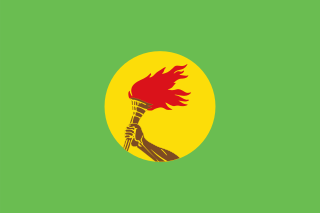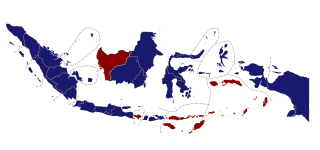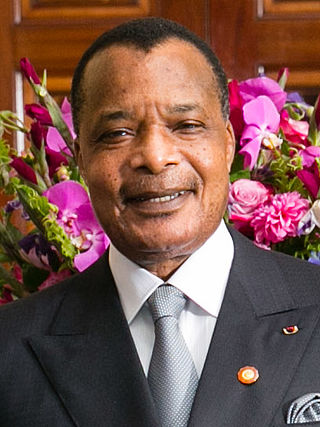
Politics of the Democratic Republic of Congo take place in a framework of a republic in transition from a civil war to a semi-presidential republic.
Iraq is a federal parliamentary representative democratic republic. It is a multi-party system whereby the executive power is exercised by the Prime Minister of the Council of Ministers as the head of government, the President of Iraq as the head of state, and legislative power is vested in the Council of Representatives.

The politics of Mongolia takes place in a framework of a semi-presidential multi-party representative democracy. Executive power is exercised by the Prime Minister, who is the head of government, and the Cabinet. The President is the head of state, but holds limited authority over the executive branch of the government, unlike full presidential republics like the United States. Legislative power is vested in parliament. The Judiciary is independent of the executive and the legislature.

Zaire, officially the Republic of Zaire, was a Congolese state from 1971 to 1997 in Central Africa that was previously and is now again known as the Democratic Republic of the Congo. Zaire was, by area, the second-largest country in Africa, and the 11th-largest country in the world. With a population of over 23 million inhabitants, Zaire was the most populous officially Francophone country in Africa, as well as one of the most populous in Africa.

Mobutu Sese Seko Kuku Ngbendu wa za Banga, commonly known as Mobutu Sese Seko or just Mobutu, was a Congolese politician and military officer who was the president of Zaire from 1965 to 1997. He also served as Chairman of the Organisation of African Unity from 1967 to 1968. During the Congo Crisis, Mobutu, serving as Chief of Staff of the Army and supported by Belgium and the United States, deposed the democratically elected government of left-wing nationalist Patrice Lumumba in 1960. Mobutu installed a government that arranged for Lumumba's execution in 1961, and continued to lead the country's armed forces until he took power directly in a second coup in 1965.
Legislative elections were held in on 5 April 2004 for both houses of the People's Consultative Assembly of Indonesia. This included all 550 seats in the People's Representative Council and 128 seats of the newly-formed Regional Representative Council.

Presidential elections were held in Indonesia on 5 April and 20 September 2004. As no candidate won a majority in the first round, a runoff was held, in which Susilo Bambang Yudhoyono defeated Megawati Sukarnoputri and was elected president. They were the first direct presidential elections in the history of Indonesia; prior to a 2002 amendment to the Constitution of Indonesia, both the president and vice president had been elected by the People's Consultative Assembly (MPR).
An indirect election or hierarchical voting is an election in which voters do not choose directly among candidates or parties for an office, but elect people who in turn choose candidates or parties. It is one of the oldest forms of elections and is used by many countries for heads of state, cabinets, heads of government, and/or upper houses. It is also used for some supranational legislatures.

Elections in Indonesia have taken place since 1955 to elect a legislature. At a national level, Indonesian people did not elect a head of state – the president – until 2004. Since then, the president is elected for a five-year term, as are the 575-member People's Representative Council, the 136-seat Regional Representative Council, in addition to provincial and municipal legislative councils.

The Pan-African Union for Social Democracy is a political party in the Republic of the Congo headed by Pascal Lissouba, who was President from 1992 to 1997. It has been the country's main opposition party since Lissouba's ouster in 1997. Pascal Tsaty-Mabiala has been Secretary-General of UPADS since 2006.

The Rally for Mali is a Malian political party created by Ibrahim Boubacar Keïta in June 2001. In 2013, Keita was elected President of Mali following several unsuccessful attempts, and the party took first place in parliamentary elections, winning 66 seats, although not enough for a majority.

The Popular Movement of the Revolution was the ruling political party in Zaire. For most of its existence, it was the only legally permitted party in the country. It was founded by Joseph-Désiré Mobutu on 20 May 1967.

The president of the Republic of Indonesia or POTROI is both the head of state and the head of government of the Republic of Indonesia. The president leads the executive branch of the Indonesian government and is the commander-in-chief of the Indonesian National Armed Forces. Since 2004, the president and vice president are directly elected to a five-year term, once renewable, allowing for a maximum of 10 years in office.

Presidential elections were held in the Democratic Republic of the Congo on 1 November 1970. The only candidate was Joseph Mobutu, who had taken power in a military coup five years earlier. The elections took the format of a "yes" or "no" vote for Mobutu's candidacy. According to official figures, Mobutu was confirmed in office with near-unanimous support, with only 157 "no" votes out of over 10.1 million total votes cast. Mobutu also received around 30,000 more "yes" votes than the number of registered voters, even though voting was not compulsory.

Parliamentary elections were held in the Democratic Republic of the Congo on 15 November 1970. They were the first parliamentary elections held since Joseph Mobutu seized power in a coup five years earlier.

Parliamentary elections were held in Zaire on 2 November 1975. At the time, the country was a one-party state with the Popular Movement of the Revolution (MPR) as the only legally permitted party. Voters approved a single list of 244 MPR candidates. Instead of the "costly and complicated" system of casting ballots, the election took place by "acclaim"; candidates were presented at public locations such as stadiums and the audience approved them by cheering.

Parliamentary elections were held in Zaire on 18 and 19 September 1982. The Popular Movement of the Revolution was the only legal party at the time, and all candidates who stood for election to the Legislative Council had to be members of it. In total, 1,409 candidates ran for the 310 seats in 154 constituencies.

Parliamentary elections were held in Zaire on 6 September 1987. The Popular Movement of the Revolution was the sole political party at the time, with all candidates running for election to the Legislative Council required to be party members. In total, 1,075 candidates ran for the 210 seats.

General elections were held in Turkey on 12 June 2011 to elect the 550 members of Grand National Assembly. In accordance to the result of the constitutional referendum held in 2007, the elections were held four years after the previous elections in 2007 instead of five.

Parliamentary elections were held in the Republic of the Congo on 16 July 2017, with a second round of voting following on 30 July in constituencies where no candidate secured a majority.













